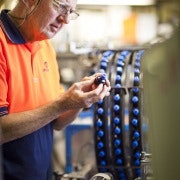A finer tune for manufacturing
Manufacturing policy is a lot like ‘80s music. It doesn’t have the retro chic of soul or punk; instead, it is deeply unfashionable. But like Tainted Love and Come on Eileen, manufacturing policy has an enduring resonance. Despite the protestations of its critics in the small government brigade, it just won’t go away.
In fact, it is a critical plank of the modern election platform. And in this election, the similarities between the two parties’ offerings are more revealing than their differences. This is no bad thing since it reflects the importance each places on manufacturing.
Of course, both Labor and the Coalition make much of the gap between them. Now that both sides have released manufacturing policies, an examination shows the differences to be rhetorical, but the underlying philosophies to be closer than they’d like you to believe.
Let’s start with the differences. The Coalition presents its policy within the wider framework of deregulation. It will help manufacturers by abolishing the carbon and mining taxes, cutting red tape, and although spoken softly, making business-friendly industrial relations changes. Its policy document talks of a new competition policy agenda, but is light on specifics. It’s hard to imagine Tony Abbott seriously tackling our big domestic oligopolies in banking, supermarkets, transport and building materials.
The biggest material difference in the two sides’ policies relates to car industry subsidies. The Coalition proposes a $500 million reduction in Labor’s Automotive Transformation Scheme, reducing the scheme’s spending to $1 billion prior to 2015, and a further $1 billion beyond that point. The effect of this would be partly offset, however, by the Coalition’s promise to cancel Labor’s changes to fringe benefits tax, a promise which should help demand for Aussie cars.
For the most part, the Coalition is simply arguing that its wider economic message (“end the waste, stop the big new taxes”) will help manufacturers. In terms of direct assistance, the package only includes $100 million of new spending.
Labor is (somewhat) more activist and offers (somewhat) more new direct assistance. Its $1 billion ‘Aussie Jobs’ package features ten proposed Industry Innovation Precincts, each of which will invest up to $50 million in building new hubs around specific industries in an attempt to recreate the best of cluster theory. Manufacturing and food are first cabs off the rank. If the Coalition’s rhetorical thrust is around deregulation, Labor’s is unequivocally around co-investment.
More notable than all these differences are the similarities between the two offers. Both promise greater advocacy for Australian businesses to work at home and overseas, with new dedicated representatives – a new Minister for Trade and Investment for the Coalition and an Automotive Supplier Advocate for Labor.
Both promise tough action on anti-dumping, with beefed-up authorities in the case of the Coalition and a new Anti-Dumping Commission from Labor.
Both promise direct financial assistance to support small to medium-sized enterprises (Can we trust the raft of SME promises?, August 23). Labor is committing $350 million to entrepreneurial SMEs and $28 million to help small business win public sector work. The Coalition is offering $50 million in Export Market Development Grants, intended to help SMEs build new overseas business.
The economic logic of the big picture arguments can sound woolly at times. The Coalition’s policy document promises that “by embracing common sense and providing practical solutions to everyday problems in the workplace…”, it will be “…helping businesses to grow, create new jobs and deliver high real wage growth.” The difficulty is that it’s hard for governments to provide practical solutions to everyday workplace problems; they are just too far removed.
Despite this, both sides are clearly committed to the traditional staples of manufacturing policy: direct subsidy support, incentives and infrastructure for R&D, assistance for exporters and SMEs. Although there is a difference in their levels of direct subsidy support, at less than $1 billion, even these are small in the context of each side’s total campaign commitments.
These staples of manufacturing policy are decried by some, particularly small government conservatives who believe the state has no place using public money to support industry. For them, “corporate welfare” is a pet hate.
Yet we should be glad that both sides of politics remain keen to support manufacturing in Australia. All countries with successful, high-value manufacturing use different forms of state support, whether defence establishment spending in the US, special enterprise zones in southern China or enormous R&D investment in northern Europe.
The costs of failing do to so are huge. Over the last 30 years, Britain’s manufacturing sector has shrunk by two-thirds and, in the Midlands and the North, barely anything has grown in its place, resulting in huge economic and social dislocation.
We should be glad of our bipartisan support for manufacturing policy. Like those ‘80s songs, it has endured because it has value. While they’ve certainly dated, there’s a good reason those tunes still get us up on the dance floor.
David Hetherington is executive director of Per Capita, a progressive think tank.
For The Centre for Independent Studies' Simon Cowan's take on the election's manufacturing consensus, click here.
















